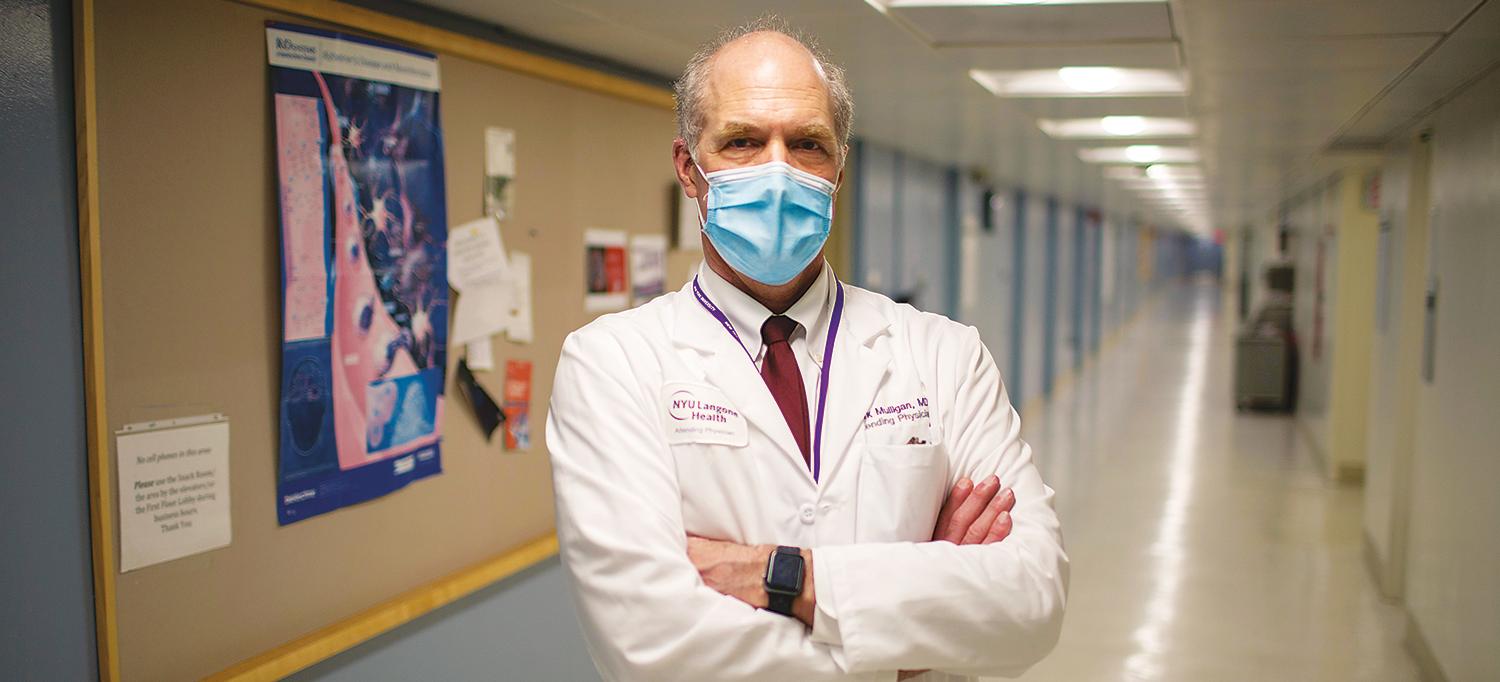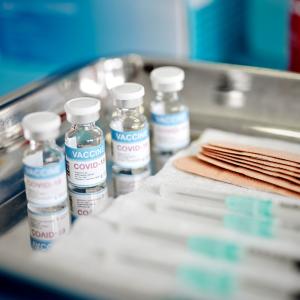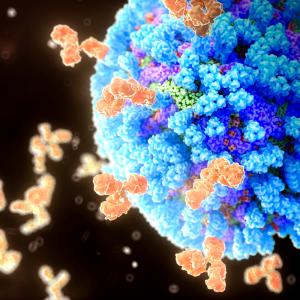In the Nation’s Early Epicenter of the Pandemic, NYU Langone Health’s Vaccine Center Is Leading an Unprecedented Global Hunt for a Vaccine

Mark J. Mulligan, MD, director of the Vaccine Center, leads 1 of 10 sites nationwide responsible for testing COVID-19 vaccine candidates.
Photo: NYU Langone Staff
When Mark J. Mulligan, MD, was recruited to NYU Langone Health in late 2018, his priority was to establish a formal center for the investigation of new vaccines. Dr. Mulligan had earned a national reputation at Emory University in Atlanta for running clinical trials of new therapies to inoculate against a host of infectious diseases, and at NYU Langone, he had planned to enlist the institution in a national effort to find a universal flu vaccine. The first step was a big one: applying for a grant from the National Institute of Allergy and Infectious Diseases to join its elite network of Vaccine and Treatment Evaluation Units, or VTEUs.
Since 1962, VTEUs have helped the nation roll out new vaccines quickly and safely. “It’s the premier network for infectious disease clinical research funded by the government,” explains Dr. Mulligan, the Thomas S. Murphy Sr. Professor of Medicine and director of the Division of Infectious Diseases and Immunology. “It’s viewed as a national resource for preparedness and responsiveness to infectious diseases.”
But with only 10 sites in the nationwide network, winning a spot on the roster is highly competitive, and NYU Langone’s leadership understood that it could take years to strengthen the institution’s candidacy. “We recruited Dr. Mulligan with the idea of establishing a Vaccine Center, but our plans were two to three years out,” says Dafna Bar-Sagi, PhD, executive vice president and vice dean for science, and chief scientific officer. “We were confident, but ours was a long-term strategy.”
Then, the pandemic hit, and everything changed. In April, with New York City under siege, NYU Langone’s application to the VTEU was green-lit, and virtually overnight, it has been catapulted to the forefront of a global race for a coronavirus disease (COVID-19) vaccine. With hospitals in Manhattan, Brooklyn, and Long Island, NYU Langone is well positioned to recruit a steady stream of diverse, healthy people from across the New York metropolitan area to test new vaccine candidates. The center, now the only VTEU in New York City, has quickly built out trial facilities in all three locations, hiring a small army of specialized nurses and administrators to help run trials for two high-profile candidates. By early May, the first volunteers were rolling up their sleeves.
One leading trial has been a partnership with the pharmaceutical company AstraZeneca and Oxford University in the United Kingdom. Their candidate, AZD1222, is based on a component of the coronavirus, known as the spike protein, that gives the virus its crownlike outer covering. Researchers believe the spike protein binds to susceptible human cells during the initial phase of infection. Based on a phase 1 clinical trial suggesting that AZD1222 is safe and can spur a protective immune response against the virus, the Vaccine Center began enrolling the first volunteers in September as part of a massive phase 3 trial aimed at answering the ultimate question: Does the vaccine protect against COVID-19? “It’s a huge effort,” Dr. Mulligan says.
A separate collaboration with pharmaceutical company Pfizer and German biotech firm BioNTech has helped advance another promising candidate, called BNT162b2. The experimental vaccine includes an RNA-based genetic template that also encodes the coronavirus spike protein. Based on the success of the phase 1 trial, partly conducted at the center, NYU Langone has been vaccinating healthy New Yorkers as part of a final phase 3 trial that aims to enroll 30,000 healthy volunteers.
The clinical trials, Dr. Mulligan emphasizes, demonstrate NYU Langone’s commitment to reducing the healthcare disparities that have contributed to a disproportionately heavy toll on some underserved communities. “We’ve made strong efforts to enroll people with higher-than-average risk for COVID-19 infection, which means racial and ethnic minorities, frontline workers, first responders, and essential workers who couldn’t stay home when many people did,” he says. “We’ve also enrolled those who are at risk for the highest levels of complications, such as older adults and those with chronic conditions.”
The trials demonstrate NYU Langone’s uncommon agility, as well. “We went from 0 to 60 in seconds,” says Dr. Bar-Sagi, the Saul J. Farber Professor of Biochemistry and Molecular Pharmacology. “Research, IT, Human Resources, Real Estate Development and Facilities, Communications, and Marketing—everyone came together to get these trials up and running. The collaboration has been simply amazing.”

